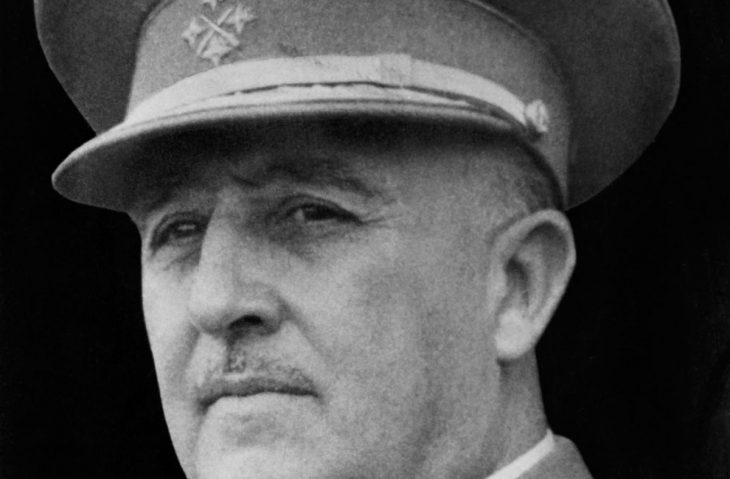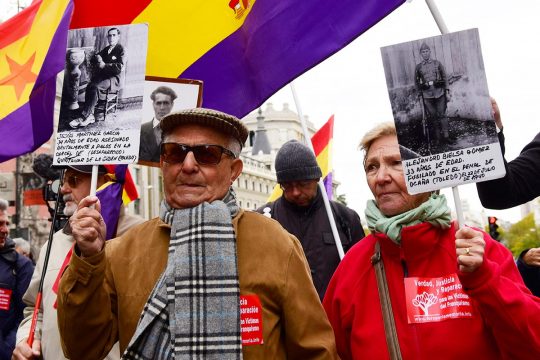Four decades after the death of Franco, the dictator who ruled Spain with an iron fist from 1939 to 1975, does it make sense to set up a “Truth Commission” on the crimes committed under his rule? This is the burning question currently being asked in Spain. New socialist Prime Minister Pedro Sánchez not only decreed on September 13 that Franco’s remains would be exhumed from their mausoleum in Valle de los Caidos (west of Madrid) in the coming months, but he also announced on August 31 his plan for a “Comisión de la Verdad” – a Truth Commission .
Unlike a number of other countries that have lived through dictatorship, Spain has never had such a mechanism. This is not because it has not been mooted, but today for the first time the desire to create one has been expressed clearly at the highest level. The Prime Minister also has enough support in parliament -- arithmetically speaking -- from the Podemos party and the Basque or Catalan nationalists.
Countering ignorance and denial
While the removal of Franco’s remains from the mausoleum (to another cemetery) is not in doubt, there is a big question mark over the creation of a Truth Commission on crimes committed under his rule. The idea is rejected by many, is subject to hot debate and raises doubts among the best specialists. At the moment, Pedro Sánchez’s idea would take shape in the following way: the Commission would be made up of jurists, investigators, historians, psychologists and academics. There would be eleven commissioners in total, of which three chosen by parliament, two by judicial authorities, one by the universities’ council, three by victims’ associations, plus two international experts. According to the Prime Minister’s plan, this commission would have access to “all necessary documents without restriction”, without the army or anyone being able to object, “even if the documents are secret”.
Among specialists on historical remembrance, some are very favourable towards the creation of such a commission, whose mandate would be to produce a report within two years. One of them is jurist Carlos Castresana. “We need it because most Spaniards do not know their recent history well, or are in denial about it,” he says. “With regard to the violence of the second Republic (1931-1939) and the assassinations perpetrated by the terrorism of the Basque group ETA the truth has been established and the victims have received reparations. So why not the dictatorship, which after the civil war was responsible for half a million people fleeing, thousands being shot dead and innumerable mass graves dug all over the country.”
Impossible single truth
But for most historians, the idea of the commission is problematic, firstly because it comes so late. “If we take the examples in Argentina, Guatemala or South Africa, the commissions were created relatively soon after the respective dictatorships,” says expert on Spain Paul Preston. But Carlos Castresana disagrees. “Better late than never,” he says. “It took half a century for the US to recognize the American-Japanese victims interned in camps during the Second World War. And it took Australia more than 90 years to recognize the abuses committed against the aboriginal people at the beginning of the 20th century.”
This issue is so controversial and emotive, it cannot have a single truth.
Another argument of those against the commission is that it would be impossible to establish an official truth with so few witnesses remaining four to eight decades on. “There is so much material that it would take many years,” says political scientist Paloma Aguilar. “I believe it is totally unrealistic to think we could establish one complete, definitive, non-controversial truth that overtakes all previous versions.”
Historian and writer José Alvarez Junco goes even further. “Not only is such an official version impossible to achieve, but I don’t think it’s even desirable,” he says. “I am opposed to teaching one single, official version in schools. History in general, and this chapter in particular, is complex and still a source of division among the population. Precisely because this issue is so controversial and emotive, it cannot have a single truth.”
Focusing on victims
Spain is not the only country facing what we might call a barrier of impunity. But many people think a commission of intellectuals or VIPs would not achieve much. Eduardo González, a former top official in Peru’s truth commission and international expert on transitional justice, shares that view. “Gathering knowledge about a period that is already very well documented doesn’t make much sense,” he says. “It would only be quantitative.
What would be new and useful would be to introduce a qualitative dimension. How? By remembering that a truth commission is primarily for the victims. We need to go beyond knowledge of the crimes under Franco to recognition. That could be done through a social movement including victims’ associations. The problem is that in Spain they are divided on the issue. But we should make no mistake, it is not too late to act. It is a question of collective will, political drive and unity amongst victims’ organizations. Truth about the crimes committed is built from those who lost, from non-experts.”
It remains to be seen how the Sánchez government will decide on this very sensitive issue.






